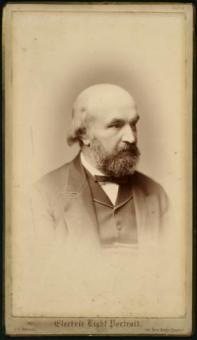|
|
A CANTAB.
CLIQUE?
 ''...the place of the Cambridge network in the British scientific
community is central to understanding the events surrounding Neptune's
discovery.' (R. Smith 1989 p.397)
''...the place of the Cambridge network in the British scientific
community is central to understanding the events surrounding Neptune's
discovery.' (R. Smith 1989 p.397)
John’s College and Trinity are adjacent colleges in Cambridge,
and those promoting Adams’ cause all attended one of them.
Trinity was Isaac Newton's college, strangely relevant if the new
planet’s prediction was indeed ‘the zenith of Newtonian
mechanics’ (N.R.Hansen, Isis 1962, 53, p.359).
John’s College:
John Couch Adams, Senior Wrangler 1823, training for Anglican
ministry
George Biddell Airy, Senior Wrangler 1823, Lucasian Professor
of Mathematics 1826, Plumian Professor of Astronomy 1828, Astronomer
Royal 1835.
Sir John Herschel, Fellow of John’s, President of the BAAS
Trinity College:
The Reverend James Challis, Senior Wrangler, Fellow of Trinity
College, Director of the Cambridge Observatory 1836-56, and President
of the Cambridge Philosophical Society 1845-7.
Adam Sedgwick, Fellow of Trinity College.
The Reverend Richard Sheepshanks, Secretary of the RAS
Augustus de Morgan, mathematician on RAS council, who wrote the
Athenaeum editorials
.
Sheepshanks as Secretary of the RAS prevented that society from
‘complete disruption’ during the crisis, by his temperate
behaviour, according to Sophie de Morgan (1882, p.134). While the
Athenaeum editorials were anonymous, it was revealed by de Morgan’s
wife Sophie that de Morgan had written them (Ibid, pp128-132). This
journal was the main British forum debating the British claim, and
its editorials exerted considerable influence amongst the cognoscenti.
An article on ‘The Cambridge Network in Action’ about
Neptune’s discovery by R.W.Smith (Isis 1989 80 395-422) found
that the large majority of the Board of Visitors at the June ’46
RGO meeting were ex-Cantabs., and four of them were professors.
His article stressed the values which Cantabs shared in common.
When Airy commenced his tenure of the RGO it was on condition that
he could sack the First Assistant, and get one with ‘a respectable
Cambridge degree’ (Autobiography, p.109).
John Hind was the one British noncantab. involved in the planet-quest.
He worked at the Regent’s Park Observatory and was an RAS
Council-member, having previously worked at the RGO. As the first
Englishman to see Neptune, his letter in The Times on October 1st
reported its discovery. He at once wrote to his friend Adams on
the 30th, saying:
‘Understanding from Prof Challis that you are occupied about
the planet of Le Verrier, I think you will be gratified to learn…
etc.’
Then, as he sensed the brewing-up of the prior-prediction claim
he wrote indignantly to the Reverend Richard Sheepshanks, RAS Secretary:
‘the Cambridge people .. do their best for their own .. I
am sure you must have noticed the inexcusable secrecy observed by
all those acquainted with Mr Adams results … [a] secrecy which
I hold to deprive him of all share in the discovery & I am very
glad to find that I am not the only one who thinks so.’ (RAS
archives, Sheepshanks papers 12th Nov. 1846)
The Athenaeum Editorials
A month after the discovery, when no British documents had been
produced nor had anyone heard what Mr Adams' predictions were supposed
to have been, De Morgan's editorial (Oct 31) in the Athenaeum advised:
'Mr Adams' claim, whatever it may be, should not be lost by an early
statement of the facts upon proof of which it is to rest ... the
facts of the discovery ... rest on records, and are perpetuated
on paper.' De Morgan hadn’t seen these records, but that didn't
stop him from claiming that Mr Adams had 'furnished Mr Challis with
the means of actually securing two observations of the planet previous
to any such announcement by M.Leverrier.'
In fact, what Adams had given to Challis to assist his sky-search
was based upon Le Verrier's June publication (see
"Adams' July Ephemeris"), and what Adams had given
to Challis prior to Leverrier's announcement was not known to de
Morgan any more than it is to us; but, were it perchance the document
to which Sampson pointed, than it erred by three degrees and was
not potentially accurate enough to find the planet (see
"Challis’ Unseen Testimony").
A month later (December 5th), de Morgan’s editorial accused
Arago, Director of the Paris Observatory, of 'mania,' and alluded
to his 'distorting mirror of national bias.'
Adams Photograph by permission of the Master &
Fellows of St John’s College, Cambridge
|

